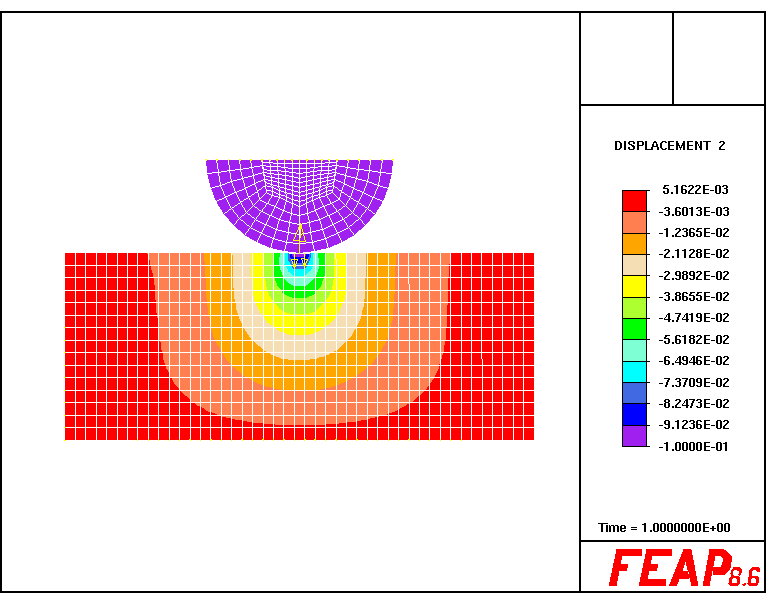Difference between revisions of "Deformable indenter"
Jump to navigation
Jump to search
(Created page with "In this example a half cylindrical indenter is pushed into a block of material. The example illustrates the use of super nodes and blending to define the indenter and the contact surface. Node to surface contact is used with augmentation. <pre> feap ** Contact Example of a deformable indenter into a block ** 0 0 0 2 2 4 mate 1 ! Indenter material solid plane strain elastic isotropic 210e5 0.3 finite mate 2 ! Material being tested solid plane strai...") |
|||
| Line 1: | Line 1: | ||
In this example a half cylindrical indenter is pushed into a block of material. The example illustrates the use of super nodes and blending to define the indenter and the contact surface. Node to surface contact is used with augmentation. | In this example a half cylindrical indenter is pushed into a block of material. The example illustrates the use of super nodes and blending to define the indenter and the contact surface. Node to surface contact is used with augmentation. | ||
[[File:Feap00014.jpg]] | |||
<pre> | <pre> | ||
feap ** Contact Example of a deformable indenter into a block ** | feap ** Contact Example of a deformable indenter into a block ** | ||
Latest revision as of 17:58, 31 May 2024
In this example a half cylindrical indenter is pushed into a block of material. The example illustrates the use of super nodes and blending to define the indenter and the contact surface. Node to surface contact is used with augmentation.
feap ** Contact Example of a deformable indenter into a block **
0 0 0 2 2 4
mate 1 ! Indenter material
solid
plane strain
elastic isotropic 210e5 0.3
finite
mate 2 ! Material being tested
solid
plane strain
elast isot 210e3 0.3
finite
para
r = 20.0 !ball radius
w = 40 !block depth
h = w/2+r !height of the half-cylinder
L = 100 !block length
n = 10 !mesh density indenter must be even
m = 15 !mesh density tested material
d = -.1 !displacement of indenter
! tested material block
block 1
cart 3*m m
mate 2
1 -L/2 -w/2
2 L/2 -w/2
3 L/2 w/2
4 -L/2 w/2
ebou add
2 -w/2 0 1
1 -L/2 1 0
! indentor using super nodes and blending
snode
1 -r h
2 -0.4*r h
3 0.4*r h
4 r h
5 -0.5*r/sqrt(2.0) -0.5*r/sqrt(2.0)+h
6 0.0 -0.5*r+h
7 +0.5*r/sqrt(2.0) -0.5*r/sqrt(2.0)+h
8 -r/sqrt(2.0) -r/sqrt(2.0)+h
9 0.0 -r+h
10 r/sqrt(2.0) -r/sqrt(2.0)+h
11 0.0 h
side
segm 5 n/2 6 n/2 7
pola 1 8 11
pola 8 9 11
pola 9 10 11
pola 10 4 11
blend ! Center of indenter
surface n n
mate 1
5 7 3 2
blend ! Outer 1/4 of indenter
surface n/2 n/2
mate 1
2 1 8 5
blend ! Outer 1/4 of indenter
surface n/2 n/2
mate 1
5 8 9 6
blend ! Outer 1/4 of indenter
surface n/2 n/2
mate 1
6 9 10 7
blend ! Outer 1/4 of indenter
surface n/2 n/2
mate 1
10 4 3 7
eboun
2 h 1 1
edisp
2 h 0 d
end
tie mate 1 1 ! Tie the indenter together
contact
surf 1
line
blend segm
polar 1 4 11
surf 2
line
block segm
1 L/2 w/2
2 -L/2 w/2
mate 1
standard
fric coul 0.5
pair 1
ntos 1 2
solm penalty 1e7 1e4
augm
mate,,1
tole,,1e-8 1e-8 1e-8
! blank line needed
end ! End contact
batch
dt,,.1
prop
plot defo
end
batch
loop time 10
cont check
time
LOOP,augment,4
LOOP,newton,30
utang,,1
NEXT Newton
AUGMent
NEXT AUGMent
plot wipe
plot mesh
plot,cont,2
plot,reac
next time
end
inte
stop
